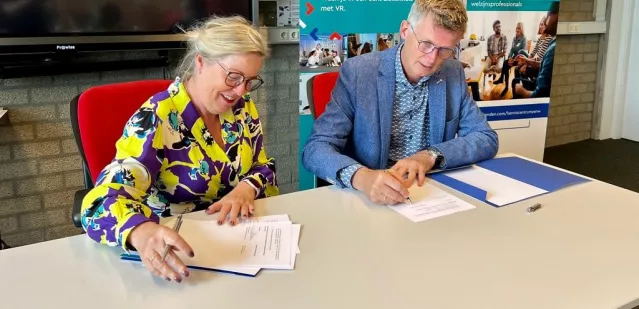
A win-win situation, Reinskje Suierveld (director Academy of Healthcare at NHL Stenden) calls the cooperation between NHL Stenden and MCL. "We have the tools and knowledge in this field and MCL has all the important practical input for the scenarios we develop. By joining forces, we can help each other further in the field of simulation education."
Last Thursday, NHL Stenden's academy of Healthcare won the Nederlandse Onderwijspremie with the 'Future proof nurses' project, in which students experience professional situations using virtual reality to improve their knowledge and skills. Suierveld: "That award demonstrates that we are at the forefront of digital innovation in healthcare and especially in the field of simulation education." The university of applied sciences is keen to share that knowledge.
Staying competent
MCL already uses a mix of educational tools to make and keep healthcare employees professionally competent. For instance, nurses and doctors (in training) follow modules, discuss cases with each other and regularly go to work in the skills lab: a modern and well-equipped room to practice medical-technical skills. Training through virtual reality (VR) had long been on the hospital's wish list.
Learning by experiencing
"Structural training with realistic VR scenarios is a valuable addition to everything we already do as part of lifelong learning," says Corina Koning, MCL's learning and development adviser. "We believe that learning happens mainly on the shop floor. With the help of VR, we can let our employees experience real-life situations, stimulating the various senses (seeing/hearing/feeling). Within a scenario, you practice making choices and experience 'live' the consequences for the patient. This makes the learning experience very powerful and valuable."
Together you can do more
According to Christiaan Boerma (dean MCL Academy), it is important to look beyond the hospital walls, because together in the region you can do more: "VR technology can help MCL to further modernise education within our hospital. If we can be a workshop for students from NHL Stenden in this, who develop VR scenarios together with us, then it's 1 + 1 = 3."
Such a VR scenario is already in place for the nurses of the abdominal surgery department at MCL. They have now followed two simulation training courses at the college. MCL and NHL Stenden are now investigating whether such training can also be developed for the ICU. In the future, the hospital and the university of applied sciences will examine how they can join forces on a case-by-case basis.



